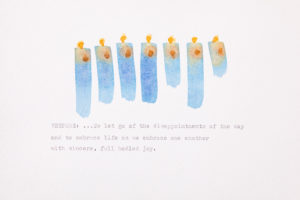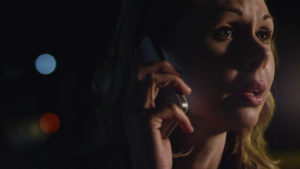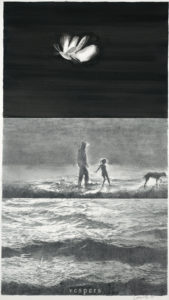The Hour of Vespers: Sundown. We gather together.
September 7, 2021

Artist Lori Fox imagines the Hour of Vespers in watercolor, with text inspired by the book Praying the Hours in Ordinary Life
This is the seventh in a series of eight reflections on the Hours of prayer, focusing on Vespers, the bookend “hinge Hour” to the sunrise of Lauds, when the sun sets. This series celebrates the release of the Praying the Hours soundtrack by Lolo Meares. An excerpt from the soundtrack starts the post so that you can have her sonic imagination of the sober beauty of this Hour in your mind as you read. (This link to the album can also be found at the bottom of this essay, along with a link to the book Praying the Hours in Ordinary Life from which the essay comes.)
The light dies.
There is a reason why the light at Vespers is referred to by filmmakers as “magic hour.” It is the end of the day. The light is golden, throwing shadows that are pleasing at this comfortable time, shadows that will become suspicious and threatening as the night deepens. It is an hour weary but beautiful with a life well-lived, an hour of fellowship, when people gather to share food and each other’s company. Vespers is a bookend to Lauds, the other hinge hour of the day, completing the sun’s slow arc through the sky. We see each other differently in its golden light, as if newly met; we see ourselves differently as reflected in the eyes of those who love us, and we believe that we have done well. Together we are able to keep the challenge of Vespers—to let go of the disappointments of the day, and to embrace life as we embrace one another: with sincere, full-bodied joy.
Night comes, accompanied by a visible sundown or not. Even if obscured by weather, the dark still comes, slowly and almost imperceptibly, as when the heart realizes that the hoped-for will not come. What of when the wind and the rain are strong enough to shudder candle flames on the table inside, and the setting sun of Vespers is invisible? When sorrow likewise prevails, and hope slips beneath the horizon under cover of a cloudy sky—can we celebrate Vespers then? Fuller Theological Seminary Professor David Scholer gave the 2008 baccalaureate speech shortly before he died. He sat behind a great table on the sanctuary stage, and it was as though he had invited us to join him at dinner. Though too weak in body to stand, he was not weak in voice, and he delivered the speech of our lives, urging us to love. His sundown happened too soon, even though his life was full of purpose until the end.He reminded us that life is not about us, but about God. And we believed him.
Polish playwright Vaclav Havel wrote, “Whether all is really lost or not depends entirely on whether or not I am lost.” At Vespers, we lay aside petty grievances and forgive, we eat together and we bless. When we gather we find a new energy because we receive it from one another. This is how one keeps from getting lost. It is a time when Jesus himself joins us, to confirm our faith and to allay our fears: “Truly I tell you, whatever you bind on earth will be bound in heaven, and whatever you loose on earth will be loosed in heaven. Again, truly I tell you, if two of you agree on earth about anything you ask, it will be done for you by my Father in heaven. For where two or three are gathered in my name, I am there among them” (Mt 18:18–21).
At Vespers, we light candles to say, “I know the sun has set, but I light a new light against the darkness as a reminder that the sun will rise again.” This is Vespers rest—the finish of one day and hope of another, and the faith of mysteries between. With Mary, we pray the Magnificat: “My soul magnifies the Lord, and my spirit rejoices in God my Savior, for He has looked with favor on the lowliness of His servant. Surely, from now on all generations will call me blessed; for the Mighty One has done great things for me, and holy is His name. His mercy is for those who fear Him from generation to generation. He has shown strength with His arm; He has scattered the proud in the thoughts of their hearts. He has brought down the powerful from their thrones, and lifted up the lowly; He has filled the hungry with good things, and sent the rich away empty.” (Luke 1:46–53).

The character “Vespers” (Beth Castle) from the Praying the Hours movie, faces a night that seems unending in its sorrow.
Ich habe Hymnen, die ich schweige
I have hymns that I have not sung.
I am out of your reach, but my heart bows toward you:
You think of me as great, but I am near.
You can hardly distinguish me
from those who kneel;
they are like grazing flocks,
and I am the watching shepherd on the hillside.
In the dusk they return home, and I follow them.
I listen to their thudding on dark bridges,
and the rising mist from their backs
veils my return.
—Rainer Maria Rilke, The Book of Hours, I, 40
translated by Martina Nagel

Denise Louise Klitsie’s triptych depicting the Hour of Vespers as the sun sets. (illustration from Praying the Hours in Ordinary Life)
Excerpt on Vespers from Praying the Hours in Ordinary Life by Lauralee Farrer and Clayton J. Schmit, Wipf and Stock, 2010, used with permission and found here. Excerpt from the album on Vespers, from the Praying the Hours soundtrack by Lolo Meares—with artwork by Lori Fox—can be freely streamed or purchased here. If you want to see the film or receive updates, write to info@burningheartproductions.com. To contribute to its release, go here.)

